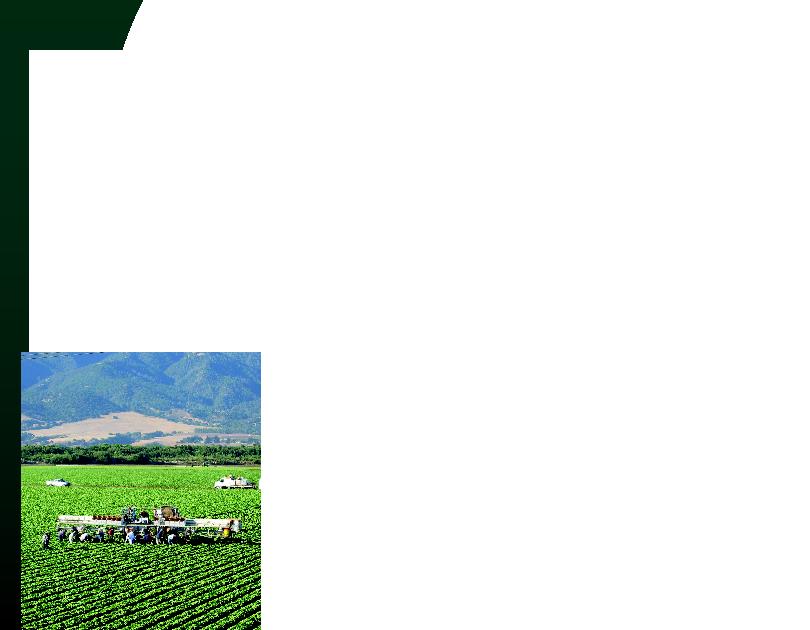
Taking Action
For a Sustainable World
In the produce industry, it all goes back to
the land. Planting, growing, and harvesting
healthy fruits and vegetables is what we do,
and the land is where it all begins.
Back in 1985 when Markon became the first
foodservice produce cooperative, we put
in place many of the precepts necessary to
sustain a greener planet, including integrated
pest management and rotational crop
planting.
Throughout the years, Markon has
continued to evolve, to learn, and to work
with our grower community to develop
environmentally conscious practices that
benefit the land that gives us our livelihood.
Tending to
Mother Nature
Markon growers employ methods that conserve
water, nurture the land, use energy efficiently, and
recycle waste.
Here are some of the many ways in which we strive
to reduce our environmental impact and preserve
the tradition of agriculture for future generations.
Precious Water:
· High-efficiency drip irrigation is used by
upwards of 75% of our primary growers
· Fields are laser-leveled for reduced irrigation
· Regular audits are conducted to identify water-
saving opportunities
· Sophisticated waste water treatment methods
have been implemented
· Recycled water is used in many facilities
Rich Soil:
· Growing methods are utilized that increase
beneficial nutrients
· Cover crops are planted that add organic
matter, reduce both soil erosion and carbon
dioxide, and offset our carbon footprint
· Rotational crop planting is used to add rather
than deplete nutrients
· Over 70% of our principal growers have
implemented integrated pest management
programs, such as using beneficial insects to
naturally reduce plant pests
Eco-Friendly Packaging:
· Recyclable or biodegradable materials are
integrated into plastics
· Biodegradable packaging and recyclable
cartons are made with post-consumer content
· PLA (polylactic acid - corn-based) packing
materials are utilized
Operating
Earth-Friendly
Smart Energy:
· One-third of our core growers use solar
energy in facilities
· Premium efficiency and/or variable speed
motors have been implemented
· Energy-efficient cooling systems and lighting
are employed
· Waste is converted to usable energy
Waste Reduction/Pollution Prevention:
· Virtually all cardboard/corrugate utilized in our
production supply chain is recycled
· Our primary shippers convert over 1.1 million
tons of trim waste to feed supplement, mulch,
or compost
· Reusable Plastic Containers (RPCs) are utilized
in harvesting
· Over 95% of our principal suppliers
participate in re-usable/recycled pallet
programs, removing the need for over 4
million wooden one-way pallets per year from
our supply chain
Transportation:
· Bio-diesel or ethanol blends are utilized
· Motor oil is recycled
· Tires are re-capped and re-used
· Railway transport is used frequently
· Whenever possible, items are sourced closer
to our facilities, thereby reducing "food
miles"
Sourcing:
· Utilize growing regions that provide the best
product with the least inputs; saves using
excess land, water, fuel, and pesticides
